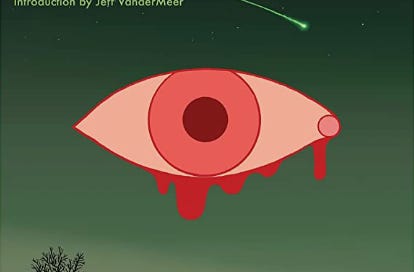A Simple Review: The Day of the Triffids-John Wyndham
A dense 234 pg journey through a crumbling yet relatable world.
I should first start off with an apology for posting this late. Our internet has been spotty, I recently had my wisdom teeth removed, and this was a rather dense read. If you want a short summary of my thoughts, skip down to the last paragraph. Otherwise, please enjoy my ramblings.
However dense it was, it was well worth it. The edition I have has a wonderful cover with a quote from Stephen King in small print describing Wyndham as, “The best writer of science fiction that England has ever produced”, and I am inclined to agree with him. (For those who are curious about the cover, and an introduction by Jeff VanderMeer, the ISBN for this edition is 9780593450086).
Wyndham has carefully crafted a unique, yet relatable account of modern society facing the destruction of everything we know. Internal problems such as the toll of loneliness, survivor’s guilt, and disillusion are well covered in a manner that every reader can understand. The narrator and main character, Bill Masen, never fails to remind the reader how damaging the loss of normality is for both the individual, and collective humanity, on both a large and small scale.
Spoilers Ahead:
Speaking about the book as a whole, using blindness as the catalyst for the end of the world isn’t necessarily traditional (compared to zombies, nuclear fallout, pandemics, etc.). However, Wyndham brings up a very good point— humans are only at the top of the food chain because of their ability to see. “I don't think it had ever occurred to me that man's supremacy is not primarily due to his brain, as most of the books would have one think. It is due to the brain's capacity to make use of the information conveyed to it by a narrow band of visible light rays. His civilization, all that he had achieved or might achieve, hung upon his ability to perceive that range of vibrations from red to violet. Without that, he was lost.”
Just as the recent The Last of Us game (and now HBO) series has done, Wyndham has presented something very real to his audience, albeit in a different sense. While blindness caused by “comets” (or as Bill believes weaponized satellites) doesn’t sound believable, the concept that one day we may lose the sense that we rely most on is something that individuals face everyday. Whether through old age, accidents, or illnesses, sudden/rapid-onset blindness is a real phenomenon that strips people from life as they know it on a daily basis. Blindness is a real issue that several humans currently face, and most humans will face it in their futures, which makes Wyndham’s story so captivating. While sci-fi is meant to lie in the whimsical and impossible, elements of realism are needed to ground the story and make it relatable enough to enjoy, and this novel helped found that principal within the sci-fi community. Wyndham allows the reader to ask themselves: Would I react with hysteria if I lost the ability to see? Would I be able to remain strong like Dennis and Mary? How else have people accepted, or rejected, their sudden disability in this novel? Would I react the same way?
The Day of The Triffids is foundational to the formation of the apocalyptic-style sci-fi genre, in more ways than helping establish realism as a necesary pillar. Published in 1951, it has set the stage for several modern texts (and even pop culture works, *cough* *cough* The Walking Dead I’m looking at you . . . and specifically the first episode). But besides the relatable despair and utter collapse of humanity there’s a touch of romance and human connection, which is a near requirement when writing an apocalypse story.
Bill meets Josella early on, rescuing her from a blind brute beating her in an alleyway for not cooperating with his demands. There are moments of over-feminized stereotypes (ex: her not being able to handle any emotionally complex problems without having “a fit”) but overall she’s presented not just as Bill’s companion, she has a blatant strength I don’t often encounter in female characters written by 1950s men. Her independence as her own character aside from Bill’s story makes their connection seem grounded. She isn’t just a classic damsel in distress, she’s an independent person navigating her own way through the new world. She chooses to stay with Bill and navigate the new world alongside him, she isn’t forced to due to annoying circumstances shielded in plot-armor. I think Wyndam displays through their relationship, the importance of building independent characters in order to make meaningful connections on the page—yet another reason this book has become so foundational to the modern writing community.
Overall, this is a unique yet relatable apocalypse story set in an alternate-universe England during the 1950s, meant for those who want a complex, yet compelling story. If you’re looking for a relaxing easy read, look elsewhere. But I suggest not to completely shy away from the denseness of Wyndham’s work, but rather save it for later. This is a must-read for sci-fi lovers everywhere.



